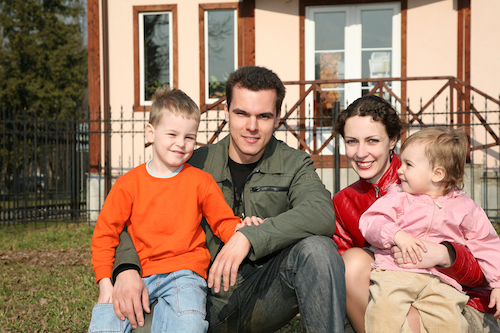 Children can be a source of joy and fun for parents. The laughter, the imagination, the cuddles and exploring the world with enthusiasm.
Children can be a source of joy and fun for parents. The laughter, the imagination, the cuddles and exploring the world with enthusiasm.
But parenting isn’t always easy. There may be laughter and good times, but there are also challenges of sleepless nights, teething, illness, toilet training and seemingly endless tears.
Parents may choose to have a second child for a number of reasons, and many embark on a journey to a larger family working on the basis that two children can’t possibly be more stress and work than one.
But recent research has proved that theory wrong, and found that having a second child intensifies time pressures on parents and contributes to the deterioration of a parents’ mental health.
“Anecdotally you always hear people say to have one kid it’s one, but to have two it’s like ten. Unfortunately, we found that it creates greater time pressure, so the second child doubles the time pressure of parents,” Dr. Leah Ruppanner, author of the study and senior lecturer in sociology at the University of Melbourne told Theravive.
Ruppanner and her colleagues used data from the Household, Income and Labour Dynamics in Australia Survey that follows 20 thousand Australians. They investigated what happened to parents’ mental health when they had their first children and when later siblings came along. They also wanted to see the impact first and second children had on parents’ time pressure.
Before having children, both mothers and fathers reported having similar levels of time pressure. When the first baby is born, this time pressure increases for both mothers and fathers, as they learn to become new parents. The researchers found that this impact was significantly greater among women than men.
The researchers noted that in Australia most mothers take a year of parental leave, whilst most father continue to work full time. They found that following childbirth, Australian parents were more likely to become traditional in their gender roles.
Second and third children do not challenge parents to learn parenting for the first time, as is the case with first-born children. It is thought that by the time second children come along, parents have learned how to feed and care for their children. The researchers note that some believe this means a second child couldn’t possibly be more stress than the first.
But their findings suggest otherwise. In reality, having a second child was found to double parents’ time pressure, regardless of whether or not they were also working. Ruppanner says this was an unexpected finding of the research.
“We found this was an experience of motherhood as opposed to working motherhood, which was surprising. What we thought we were going to find was the time pressure was going to be concentrated on mothers who were working. So it does surprise us on some level,” she told Theravive.
The researchers found that this increase in time pressure also had implications for a parents’ mental health.
A mother’s mental health was found to improve immediately following the birth of the first child, and fathers also have a boost in mental health with their first born. For second born children however, the mothers’ mental health deteriorates sharply and remains low. Fathers were also found to experience a dip in mental health following the second child, however unlike mothers who remain low, fathers mental health plateaus over time.
The authors of the study argue this suggests fathers aren’t facing the same persistent time pressures as mothers are long term.
It’s a phenomenon Ruppanner has seen among her own circle of friends.
“I have friends who have second children and they are just exhausted. I can hear it in their voices. Everyone loves the children… but they are swamped,” she told Theravive.
“What’s happened as a result of me writing this is I have many of my friends reach out and say ‘yes you’re right on the money, the second child is what knocked me out… in terms of my mental health, in terms of feeling overwhelmed’,” she said.
The researchers had hoped that as children grew up, parents would experience lower levels of time pressure as their children went to school, but the time pressure continued. Dropping down to part time work made no difference in alleviating this feeling of time pressure.
Ruppanner says policy makers should prioritise maternal mental health to help the large number of women experiencing significant time pressure and deterioration of mental health due to the demands of caring for a family.
She says the research has sparked numerous important conversations about the challenges of raising children whilst still looking after ones’ own mental and physical health.
“What’s happened with this study in particular is that it’s resonating with people and there’s a reason it’s resonating with people. We’re not saying anything that is that shocking but we are articulating scientifically experiences many women and families have once they move from the first to the second child,” she said.
Elizabeth Pratt is a medical journalist and producer. Her work has appeared on Healthline, The Huffington Post, Fox News, The Australian Broadcasting Corporation, The Sydney Morning Herald, News.com.au, Escape, The Cusp and Skyscanner. You can read more of her articles here. Or learn more about Elizabeth and contact her via her LinkedIn and Twitter profiles.